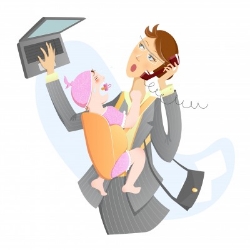If you’re reading this, it’s because you or someone you love is a bright, talented, motivated person with big ideas… and possibly at risk for depression too. If you’re familiar with entrepreneurism, and the personality that often accompanies it, you’ll know that failures common to entrepreneurialism can cause depression.

Entrepreneurs often feel alone in their endeavors, their challenges, and yes, even their emotional ups and downs. They recognize they are a little different. They know they are not like the rest. They are a little more driven, a little more obsessed and a little less content than the average person. However, every strength twins as a weakness. Every positive has it’s negative. And every driven, high performing, hard-working entrepreneur has a down side. Often that down side is depression. Here are the top 10 problems common to entrepreneurs that lead to depression, and steps to turn it around.

Top 10 Problems Common to Entrepreneurs
1. Feigned optimism. Entrepreneurs need others to believe in them for their ventures to succeed. Often, they don’t feel like they can show doubts, fears or insecurities because it will lead others to doubt. Hiding these feelings compounds them and makes them worse.
2. Impossible Goal Conflict. Entrepreneurs feel damned if they do and damned if they don’t. They feel trapped into the impossible task of making investors, employees and family happy, often feeling like they fail at all three.
3. Future Tripping: Entrepreneurs’ minds may frequently review all the worst-case scenarios, trying to find imaginary solutions to things that never actually happen. Resting, meditating or staying in the present actually feels lazy and unproductive to them. Unfortunately, future tripping is a fast track to a depression crash.
4. Musterbation: Entrepreneurs often feel a sense of being over responsible for too many things and to too many people. These things are largely out of their control, but they try to control them anyway. Their impossible expectations of perfection sound like, “I must be my best,” and “I must make the right decision,” and “I must not let them down.” They musterbate themselves into a hole, leaving little energy for creative problem solving.
5. Rumination: Regret can be a real killer if it is not effectively used for forward learning. Entrepreneurs have to collect a few failures under their belt in order to qualify as real entrepreneurs, right? But belaboring those failures can negate their usefulness.
6. Chronic Anxiety: Acute stress is the reaction to an immediate threat and is considered desirable as it primes your brain for peak performance. But Chronic, unresolved stress increases the stress hormone cortisol and affects brain functioning, and can increase the occurrence of mood disorders and physical illness. Entrepreneurs can go from one stressor to the next without taking necessary time to debrief.
7. Risky Business: The challenge is what excites the entrepreneur, but an environment fraught with interminable risk of failure can haunt the most positive among us. Starting a new business often requires a serious amount of debt in the beginning. The pressure of being indebted can take entrepreneurs to their breaking point.
8. PTSD. Seriously. I’m not even joking. Once an entrepreneur has tasted painful, dream wrecking failure, traumatic residue is left behind making current risk seem bigger, scarier and insurmountable. But the scale of the current problem is a lot less than the scale of the emotional reaction.
9. Hypomanic Let Downs: Sometimes entrepreneurs’ ambitious, little-to-no-sleep, hyperactive, get-er-done high life comes down. Down off the high. Whether it’s after a launch, or after a great accomplishment or a less than fantastic result, the high ends in a low. They leave their team, they go home, and the let down is real.
10. Isolation and Lack of support: It’s no surprise to an entrepreneur that it’s lonely at the top. And at the bottom too, for that matter. They feel like they don’t have a “trusted someone” to talk things over with, or who truly understands the pressure.
Well, that list was depressing.
If you’re an entrepreneur, you know that the same passions that drive you, can consume you too. It’s necessary to put those passions outside of yourself just long enough to take care of yourself. Here’s how.

So What Should You Do to Cope?
- The older, the wiser and the more seasoned among us would say, “Take a One-Day-at-a-Time approach.”
- Be honest about the way you’re feeling. You can be honest about your insecurities and still be strong. Seriously. It’s a thing.
- Instead of musterbating and ruminating, take a day to play. Do something enjoyable, for Pete’s sake. Remember, you’re not God so you don’t have to be perfect.
- Instead of anxiously asking yourself, “What if this happens,” or “what if that happens,” tell yourself, “Whatever happens, I’ll be able to handle it. I’ve done hard things before, I can do hard things again.”
- Anxiety kills creativity. So instead of fueling chronic stress, treat it to a doctor’s visit.
- When in doubt, run it out. Remember physical exercise is your brain’s friend. And you like your brain. You want it to work well.
- Meditate. This is a skill that can be taught and learned, and can rejuvenate a tired mind.
- Self-worth doesn’t equal net worth. Be kind to yourself before you’re a success. Don’t make self-love conditional on your success.
- PTSD requires a skilled clinician to treat it well. Treatment doesn’t have to take months and months. Depending on the circumstance, PTSD can be treated relatively quickly.
- Reach out to others in similar boats. Tell your story, and let them tell theirs. Make sure you are actively involved with other people who have similar passions and experiences. Spending time together will help you recharge.
I’ve talked with brilliant, motivated, skilled people who, because of facing too many failures too many times, started to consider suicide as a way out. One man told me that his experience of bankruptcy felt so hopeless and humiliating, it drove him to consider ending his life. His thoughts truly scared him. He didn’t know he could drop so low, but he had. It was then, that he reached out to a counselor and some family members about how he was feeling. He took a bold step to get the help he needed. Today, he is running a very successful business and is just about ready to sell it for 20 times the amount he started with.
If you are an entrepreneur and have faced feelings of depression, I hope you know you are in good company.The world needs your creativity, your vibrancy and your stick-to-it-tive-ness. Don’t let another day go by without giving yourself the support you need.


